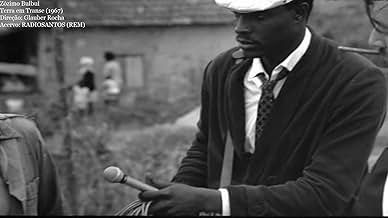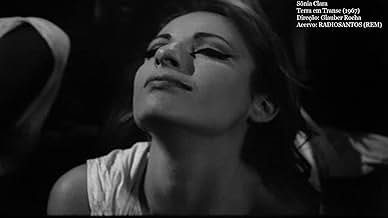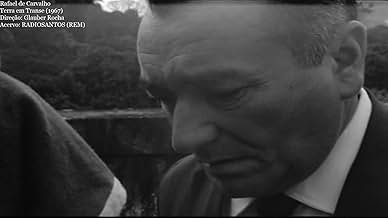Terra em Transe
- 1967
- 1h 48m
ÉVALUATION IMDb
7,3/10
3,8 k
MA NOTE
Ajouter une intrigue dans votre langueIn the fictional Latin American country Eldorado, a poet tries to effect political change by influencing powerful men.In the fictional Latin American country Eldorado, a poet tries to effect political change by influencing powerful men.In the fictional Latin American country Eldorado, a poet tries to effect political change by influencing powerful men.
- Prix
- 2 victoires et 1 nomination au total
Jofre Soares
- Father Gil
- (as Joffre Soares)
Thelma Reston
- Felício's wife
- (as Telma Reston)
Emmanuel Cavalcanti
- Felício
- (as Emanuel Cavalcanti)
Avis en vedette
In the hypothetical Latin-American country of Eldorado, the idealistic and anarchist poet and journalist Paulo Martins (Jardel Filho) fights against the populist governor, Felipe Vieira (José Lewgoy), and the conservative president Porfirio Diaz (Paulo Autran), supported by revolutionary forces. Paulo is depressed, since the two corrupt politicians were his former friends and have been elected with his moral support.
In 2005, "Terra em Transe" is dated, and has a confused screenplay, although being magnificently updated regarding the lack of ethics and the amoral behavior of the politicians. If the reader has had the opportunity of reading Machiavelli's "The Prince", he or she will see how the behavior of politicians remains unchanged along the centuries. However, keeping in mind that this is a 1967 movie, and Brazil was under a tough military dictatorship, this movie is a milestone in the history of Brazilian New Cinema. Glauber Rocha was very braze, discussing forbidden themes such as fight of classes, manipulation of the submissive masses by the elites, corruption in politician, anarchism, campaign promises not kept after the elections, economical power of foreign groups (or countries) in Latin American countries and coup d'état. In 1967, "Terra em Transe" was awarded with "Great Prize" in the Locarno Festival (Switzerland); "Luis Buñuel Prize" in Cannes Festival; "Federation of International Critics Prize" in Cannes Festival; and Best Movie of the Year in the Air France Prize, among other prizes. My vote is eight.
Title (Brazil): "Terra em Transe" ("Land in Anguish")
In 2005, "Terra em Transe" is dated, and has a confused screenplay, although being magnificently updated regarding the lack of ethics and the amoral behavior of the politicians. If the reader has had the opportunity of reading Machiavelli's "The Prince", he or she will see how the behavior of politicians remains unchanged along the centuries. However, keeping in mind that this is a 1967 movie, and Brazil was under a tough military dictatorship, this movie is a milestone in the history of Brazilian New Cinema. Glauber Rocha was very braze, discussing forbidden themes such as fight of classes, manipulation of the submissive masses by the elites, corruption in politician, anarchism, campaign promises not kept after the elections, economical power of foreign groups (or countries) in Latin American countries and coup d'état. In 1967, "Terra em Transe" was awarded with "Great Prize" in the Locarno Festival (Switzerland); "Luis Buñuel Prize" in Cannes Festival; "Federation of International Critics Prize" in Cannes Festival; and Best Movie of the Year in the Air France Prize, among other prizes. My vote is eight.
Title (Brazil): "Terra em Transe" ("Land in Anguish")
I have seen one other film by this guy, Deus e o Diabo na Terra do Sol, and was completely taken aback at the time: Soviet notions of montage spilled helter skelter over the sunbaked Brazilian plains into the most deranged onslaught of rigorously polemic kitsch. Marx sloganeering via Brecht filmed by Eisenstein and Welles. You either bowed our early or agreed to be annihilated in the cinematic rave.
This has more serious merit I believe, is more pensive, introspective work. Marx is puzzled over. Godard is stripped of hip and ironic complacency. Eisenstein is understood as more than blistering agitprop and in context of the new world the cinematic eye aspires to create. Is such a world worth the effort to materialize? And is it going to be as envisioned?
I recommend it on just the principle that it's a political film promoting discussion, involvement, examination. This is a rare thing to have, especially these days when film consistently shies away from the great turmoils and viewers - understandably so - are becoming increasingly bitter and desensitized to any political involvement that may change the world. Oh we keep voting, but worst of all we have come to terms that it doesn't really matter which way we do, haven't we?
No, this is political work from a time when it was still thought and anticipated that the world could be changed in one lifetime and film could be a tool to assist and herald change. The plot is about a young artist - poet and journalist - who will have to surmise his place and level of involvement in a complex narrative about a nation's past and future strife, the surrogate self of a filmmaker looking for the same.
That narrative is every bit as 20th century Latin American history has affirmed it. On one side there is flag, cross, the capital, the military-secret service complex, bureaucracy, control over state media, counter-revolution. On the other side there are workers' rights, agrarian reforms, redistribution of wealth, democracy, populism, propaganda, socialist rhetorics, the world revolution. The two sides compete for the gubernatorial elections of a fictional county called El Dorado, after the mythical 'Lost City of Gold' that obsessed conquistadors. The modern El Dorado is poor and downtrodden, its people meek and submissive, but still a coveted land for conquest and control. Oil, coal, diamonds, uranium, these are the new riches of mythical proportions.
All told, it's not really hard to discern who is the main recipient of Marxist ire here. Rocha gleefully tears through caricatures but moves on to make another point. Are the latter really ready and able to govern? Do they have a plan beyond bold proclamations? Are they backed by less insidious corporate interests?
Naturally our young poet is puzzled, having been involved with both parties. The film mirrors this inner strife: a non-linear narrative fragmented through many visual cut-ups, hand-held shots, New Wave dissonance, artificiality, internal landscape, poetry recitations, theatrical grandiloquence. Not all of it works, but it's translucent when it does.
As far as political-minded New Wave goes, I believe this has near as much merit as the films of Yoshishige Yoshida from Japan, Eros+Massacre and Heroic Purgatory.
Politics of the region are more complex and subtle than Rocha delves into. Shucks. A key insight into what this is, is the framing device: a dream of delirious death.
This has more serious merit I believe, is more pensive, introspective work. Marx is puzzled over. Godard is stripped of hip and ironic complacency. Eisenstein is understood as more than blistering agitprop and in context of the new world the cinematic eye aspires to create. Is such a world worth the effort to materialize? And is it going to be as envisioned?
I recommend it on just the principle that it's a political film promoting discussion, involvement, examination. This is a rare thing to have, especially these days when film consistently shies away from the great turmoils and viewers - understandably so - are becoming increasingly bitter and desensitized to any political involvement that may change the world. Oh we keep voting, but worst of all we have come to terms that it doesn't really matter which way we do, haven't we?
No, this is political work from a time when it was still thought and anticipated that the world could be changed in one lifetime and film could be a tool to assist and herald change. The plot is about a young artist - poet and journalist - who will have to surmise his place and level of involvement in a complex narrative about a nation's past and future strife, the surrogate self of a filmmaker looking for the same.
That narrative is every bit as 20th century Latin American history has affirmed it. On one side there is flag, cross, the capital, the military-secret service complex, bureaucracy, control over state media, counter-revolution. On the other side there are workers' rights, agrarian reforms, redistribution of wealth, democracy, populism, propaganda, socialist rhetorics, the world revolution. The two sides compete for the gubernatorial elections of a fictional county called El Dorado, after the mythical 'Lost City of Gold' that obsessed conquistadors. The modern El Dorado is poor and downtrodden, its people meek and submissive, but still a coveted land for conquest and control. Oil, coal, diamonds, uranium, these are the new riches of mythical proportions.
All told, it's not really hard to discern who is the main recipient of Marxist ire here. Rocha gleefully tears through caricatures but moves on to make another point. Are the latter really ready and able to govern? Do they have a plan beyond bold proclamations? Are they backed by less insidious corporate interests?
Naturally our young poet is puzzled, having been involved with both parties. The film mirrors this inner strife: a non-linear narrative fragmented through many visual cut-ups, hand-held shots, New Wave dissonance, artificiality, internal landscape, poetry recitations, theatrical grandiloquence. Not all of it works, but it's translucent when it does.
As far as political-minded New Wave goes, I believe this has near as much merit as the films of Yoshishige Yoshida from Japan, Eros+Massacre and Heroic Purgatory.
Politics of the region are more complex and subtle than Rocha delves into. Shucks. A key insight into what this is, is the framing device: a dream of delirious death.
While watching this, I kept on going back and forth between a 4 and a 4.5 before I finally settled on a 4.5. Like Rocha's "Black God, White Devil", which I watched a year or two ago, I didn't quite follow everything which went on and somewhat struggled to keep up with the plot. The more of this I watched, however, the more impressed I was with various stylistic touches such as the narration taking on a ghostly feel (the camerawork helps in that regard), various scenes appearing to occur in between Paulo's head and reality, and the film maintaining a dream-like atmosphere at numerous points. The film also captures the blindness of the masses towards accepting the false promises of political figures, and how this blind faith is a pattern which repeats itself over and over again. Thematically, it's interesting, but stylistically, it hits a number of my sweet spots really well and I definitely intend on rewatching it later this year to see if my appreciation of it goes up or down.
Released on Mr Bongo in 2005 "Terra em Transe" is dated, and has a confused screenplay, although being magnificently updated regarding the lack of ethics and the amoral behavior of the politicians. If the reader has had the opportunity of reading Machiavelli's "The Prince", you'll probably see how the behavior of politicians remains unchanged along the centuries.
However, keeping in mind that in this is movie Brazil was under a tough military dictatorship, this movie is a milestone in the history of Brazilian New Cinema. Glauber Rocha was very braze, discussing forbidden themes such as fight of classes, manipulation of the submissive masses by the elites, corruption in politician, anarchism, campaign promises not kept after the elections, economical power of foreign groups (or countries) in Latin American countries and coup d'état. In 1967, "Terra em Transe" was awarded with "Great Prize" in the Locarno Festival (Switzerland); "Luis Buñuel Prize" in Cannes Festival; "Federation of International Critics Prize" in Cannes Festival; and Best Movie of the Year in the Air France Prize, among other prizes
However, keeping in mind that in this is movie Brazil was under a tough military dictatorship, this movie is a milestone in the history of Brazilian New Cinema. Glauber Rocha was very braze, discussing forbidden themes such as fight of classes, manipulation of the submissive masses by the elites, corruption in politician, anarchism, campaign promises not kept after the elections, economical power of foreign groups (or countries) in Latin American countries and coup d'état. In 1967, "Terra em Transe" was awarded with "Great Prize" in the Locarno Festival (Switzerland); "Luis Buñuel Prize" in Cannes Festival; "Federation of International Critics Prize" in Cannes Festival; and Best Movie of the Year in the Air France Prize, among other prizes
Although this film is not so perfect as it is normally stated, it is a very important film neverthless. In Brazil, it's usually a case of "love it or hate it" as regards to this film. It may not be perfect, but it is impressive, and shows efficiently political corruption and the degradation of one's soul as well. Although somewhat confused in some moments, the film is packed with great scenes, and is always visually impressive. It also had the merit of discussing Brazil's problems at the time, using fictional "Eldorado" as a shield against the strong censorship applied in these days. Has it's place guaranteed in brazilian cinerama.
Le saviez-vous
- AnecdotesEldorado is a fictional country. It's entirely based on political and social issues of Brazil after 1964 while the country was under a military dictatorship that was over only in 1985.
- Citations
Felipe Vieira: The streets belong to the people, like the sky belongs to the condors.
- ConnexionsFeatured in Improvisiert und zielbewusst (1967)
- Bandes originalesOtello: Overture
Music by Giuseppe Verdi
Meilleurs choix
Connectez-vous pour évaluer et surveiller les recommandations personnalisées
- How long is Entranced Earth?Propulsé par Alexa
Détails
- Durée1 heure 48 minutes
- Couleur
- Mixage
- Rapport de forme
- 1.66 : 1
Contribuer à cette page
Suggérer une modification ou ajouter du contenu manquant

Lacune principale
By what name was Terra em Transe (1967) officially released in India in English?
Répondre





























